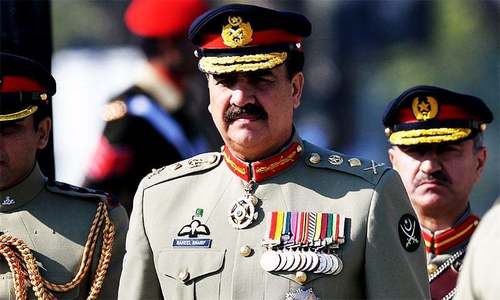
AFTER the government said it had given its consent to retired Gen Raheel Sharif accepting the offer to head the Saudi-led Islamic Military Alliance to Fight Terrorism, there were two scenarios emerging about what may happen over the coming months.
The lack of clarity and detail is triggering speculation about what this decision actually means and the Foreign Office spokesperson’s assertion that the country is already part of the Riyadh-based alliance is also surprising as this was the first official admission to that effect.
While saying that Islamabad was part of the Saudi-led alliance, the foreign office spokesperson also conceded that the ‘terms of reference’ of the grouping have yet to be decided. So, what exactly has Pakistan signed on for?
Consider the first scenario: Pakistan has finally admitted what many believed to be the case anyway as, given how close (some would say beholden) to the Saudi regime the PML-N government and the armed forces have always been, it wasn’t likely that a parliamentary resolution calling for neutrality in the Middle East would have real long-term viability.
Also, Pakistan’s task may have been made easier by the Saudi regime’s realisation that calling for Muslim nations to join the war it is waging in Yemen, and its efforts to militarily checkmate Iran in other parts of the Gulf may not draw the desired response.
The former army chief had, it was said, set certain conditions before he accepted the reportedly $1million a year job.
Ergo, Saudi Arabia is now saying that the alliance is not being formed to fight in Yemen or to counter Iran in the region but actually to fight the menace of the militant Islamic State group, also known as Daesh, which is seen as a growing threat, despite the recent setbacks suffered by the terrorist group in Iraq and Syria.
That then will remain the official Saudi position till May when, some media reports have suggested, there might be greater clarity as the alliance’s terms of reference and other details will be hammered out at a meeting of key member states.
The second scenario owes itself to the categorical statement of a former three-star general, who is seen as close to the former army chief and has also spoken for him and the security establishment in recent media appearances.
When the news of the appointment first broke, the retired lieutenant general spelt out the specific conditions under which Raheel Sharif would accept the reportedly $1million a year job. Otherwise, he said, the former chief was likely to say no.
The first was that no matter what the circumstances, he would not be willing to serve under an officer belonging to the Saudi defence forces or anyone else from the alliance’s member states as he had had the privilege of ‘serving as the head of one of the best armies in the world’.
The other two conditions were even tougher and, when they were laid out, many commentators thought the matter would go no further as the Saudis were not likely to agree to them. Till May at least it will be impossible to say what has happened on that score.
One of these two conditions, according to the retired lieutenant general, was that Iran be offered a role in the alliance too, even if it was a token one, so that Tehran would be reassured the grouping was not meant to be arrayed against it and remove any other misgivings it may have.
And the final condition sought freedom for Raheel Sharif to take the initiative and mediate in disputes between different Muslim countries as, he believed, these frictions were often the trigger for terrorism.
Assuming that the former army chief’s view has found acceptance in Riyadh, it would be safe to say that upon taking office one of his first tasks would be to offer a place in the alliance to Tehran, even though there is no way of knowing the latter’s reaction at this stage.
He’d initiate an effort to help end the conflict in Yemen where, human rights groups say, the result of the Saudi-led blockade and bombing is creating a catastrophic humanitarian crisis. One can also assume he would try and mediate some sort of a way out of the ongoing human tragedy in Syria.
This one may prove much, much tougher: the civil war in Syria has not just been fuelled by Syrians of different persuasions but also because several Muslim countries, motivated by sectarian considerations, are also neck deep in their involvement.
Even though Russia became an active player and helped turn the tide in favour of the Syrian regime, there seems no end in sight to the conflict. The slightest movement in any of these areas will go a long way in establishing Raheel Sharif’s credibility as a visionary military leader.
On the flip side, it would seem unlikely that his conditions would have been accepted. After all, the burgeoning Saudi defence budget (at more than $50 billion) places the kingdom among the top five global military spenders. A list that suggests only the US, China, UK and India are ahead of it.
This magnitude of spending appears more a statement of intent by Saudi Arabia to assert influence in the region where it feels threatened by Iran, rather than merely to fight terrorism and the terrorists towards whom it is sometimes accused of being ambivalent.
In the best-case scenario, Pakistanis will be joined by the rest of the Muslim world, the Ummah, in saying a vociferous and lasting ‘Thank You Raheel Sharif’. If this is not the case, his detractors will liken him to Alice in Wonderland.
Which will it be? Who knows for sure? I am happy to place my bet in private though.
The writer is a former editor of Dawn.
Published in Dawn, April 1st, 2017













































